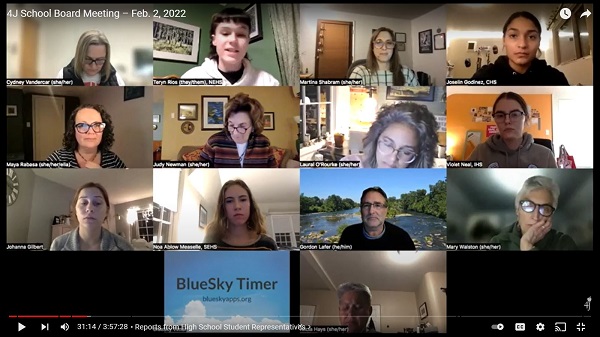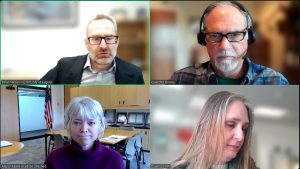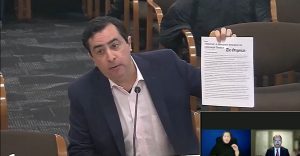4J student leaders: We need mental health services, more support reporting hate crimes
7 min read
CALC organizer Mica Contreras spoke April 11th about the rise of hate crimes in our schools.
[00:00:05] Mica Contreras: My name is Mica Contreras and I am the Justice and Equity Program Organizer over at CALC.
[00:00:11] We know that there have been unfortunately, multiple school-related incidents that have involved hate symbols including neo-Nazi ideology, the Confederate flag, nooses. It’s ramped up in the last couple of years.
[00:00:24] Oregon has a long history of racist policies and customs; at one time Oregon was set up to be the ‘white utopia,’ a whites-only state. We are home to a disproportionate number of hate groups, and unfortunately our students are also being actively recruited by white nationalists. They are targeting middle school boys. And we know that they’re also actively organizing to try to gain power from the local school board level and they have been effective in certain places,
[00:00:53] We also know that racist incidents in schools are on the rise and we know that hate and bias incidents, they’re predominantly motivated by race. The racial harassment has been ranging from common microaggressions, unfortunately, to racial slurs, to graffiti, to intimidation, and then to violence. The most egregious things that I’ve seen happening this year, these included online harassment, including threats of sexual violence and lynching,
[00:01:20] We know that racial harassment contributes to poor educational and health outcomes. The implications of undergoing stress and trauma on a daily basis are huge. They have health implications that go to the next generation. We know that the ability to learn is compromised when students don’t feel safe. We know that racial harassment contributes to racial trauma and stress and can lead to racial battle fatigue, which can result in poor health outcomes, which is one of the reasons why racism was just declared a public health crisis in Lane County and also nationally.
[00:01:52] When these things happen, it’s not only happening to one student, it’s happening to the whole community. I’s traumatizing and affecting the whole community.
[00:01:59] I’ve been hearing educators who have not been intervening and overlooking incidents, this could be because they don’t know how to intervene. They don’t feel like they have the district’s support. There’s many reasons for this, but this is definitely happening.
[00:02:10] John Q: Mica played a clip of students speaking at the February 2nd 4J board meeting.
[00:02:17] Joselin Godinez: I’m Joselin. I’m from Churchill High School.
[00:02:22] A lot of affinity groups, students of color aren’t feeling supported from faculty at my school either. And it’s starting to not feel super great just from me personally. And then mental health is a pretty big thing right now. Personally, I have been struggling a little bit with school, especially our seniors and juniors just needing to figure out what we’re doing after high school, and figuring all this stuff out. But even for underclassmen, it’s a lot to come back from doing nothing to doing everything. So that’s been a little stressful.
[00:02:58] Teryn Rios, NEHS: Thank you guys for recognizing that there are Issues of racism that are going on within our school, because it has felt like no one has been talking about it. But it also seems like the support from our school is mostly coming from our teachers of color and our affinity group leaders.
[00:03:16] And then also, as Joselin said, mental health, I think it’s incredibly important to be addressing that. And just mental health resources , we need more mental health resources within our schools and talking about the recent events that have happened and just like addressing that and how it conflicts with our mental health.
[00:03:35] And then also I want input on how we can make our schools feel safer. And if this has happened in the past, how had, how have we combated it and how have we done things to move forward?
[00:03:50] Johanna Gilbert, Sheldon: I’m Johanna Gilbert. And I’m the student board rep from Sheldon High School.
[00:03:55] We have felt really strongly that we don’t have enough access to in-person health resources, whether that’s physical health care or mental health care. And it’s been really strongly felt amongst our student body that we need to have people, not just information about resources that are out there in the community for us to go find ourselves, but really people on campus who are equipped to help students with physical and mental health issues.
[00:04:24] And students who have 504 plans for depression, anxiety, ADHD, all of those things, which has greatly increased, don’t feel that their their 504s were being honored by their teachers, on a large scale. And I think some of that is the system through which it is communicated. Students have felt like their IEPs and 504s have not been given the attention that they should be. And they have not been provided with the appropriate accommodations.
[00:04:54] Noa Ablow Measelle, SEHS: Hello, my name is Noa and I’m the representative for South Eugene High School. Student government put together a human rights and community involvement assembly and there were speakers brought in from different resources and groups just so that students could form a better connection with different mental health resources, or sexuality resources in the community.
[00:05:15] And while it does feel like there are resources at South that students have access to, I don’t think that a lot of students take advantage of those resources. So I think it would be important to start bringing things more directly into the classroom so that students don’t really have to go out of their way in order to access mental health resources, but they’re really brought to them.
[00:05:38] Violet Neal: I’m Violet, and I go to International High School, and I’m also a student at Churchill High School.
[00:05:43] A black student leader within the 4J community allowed me to include this quote. It said: ‘I’m scared to be direct about who isn’t doing what and who is blatantly lacking in supporting marginalized students, because of the risk to my own safety and the prospect of being targeted.’ That’s the end of the quote.
[00:05:56] There’s definitely safety concerns the students are feeling every single day, especially with these racist occurrences happening within all of our schools. It is felt throughout the district. And just because one large incident isn’t happening specifically within International High School or Churchill, these occurrences do happen and do affect the students throughout.
[00:06:13] And I don’t believe proper care is being given to these students, especially Black students, and I don’t believe that it is students’ jobs to always advocate for themselves, especially when they are living a marginalized identity and have to deal with this every day.
[00:06:27] And then basically echoing what Johanna said earlier. I did have some students come to me wondering about 504 plans, because they’ve had teachers basically saying that they didn’t understand their plan, so they didn’t want to do it, and having to advocate for themselves continuously, and getting their parents involved even after these plans were already set up. So that’s just definitely a concern because there isn’t really a justifiable excuse for just saying that you don’t understand it, so you don’t want to do it.
[00:06:56] June: I’m June and this is Joseph. We are both non-binary high school students here in 4J. One thing the racial harassment policy is lacking is a texting line that students can use to report incidents. We always talk about how people will be extra mean on the internet because they can hide behind a screen. I believe students would most likely feel more comfortable in reporting incident via text than in person, or even on a phone call with someone. I believe that having a texting line will lead the recording to happen at a more timely manner.
[00:07:24] Joseph: We both experienced confusion in the reporting system reporting an incident of racism and insensitivity from a staff member. A few weeks later June happened to see the administrator we reported to, and asked them if anything happened. June was told that conversation took place, but the administrator couldn’t tell them due to admin staff confidentiality. That conversation made us wonder if something even happened or if it was just an excuse, because now after this, dealing with hopelessness, it’s making us very wary of the system.
[00:07:59] Mica Contreras: Those were all recorded prior to the adoption of the racial harassment policy and the text line that those students were advocating for was something I was trying to get in. I want to ensure that that text line is up and ready to go because there haven’t made any progress on that yet either.
[00:08:15] Continued advocacy is super important. This policy was adopted unanimously on March 2nd, but it’s not fully operational.
[00:08:22] They did implement a hate and bias incident response team. They have their own name for it, but it is not in the policy, so we have to ensure that they’re going to keep that active and going because it’s not mandated by the policy.
[00:08:38] As a district they are looking at ways to reduce disproportionate discipline, especially of our Black, Indigenous and other communities of color. And It’s not going fast enough. Nothing is going fast enough for my taste, but that’s why we keep working on it.
[00:08:52] The whole point of transformative justice is really to get at the root causes, to address harm without replicating it, to look in how all the systems are working together that allowed the harassment or whatever the harm caused to happen to begin with, so we can focus on all of them, not just focusing on one person and to promote true accountability and community.
[00:09:12] And we should continue to advocate for more mental health resources to be made available to the communities where these events are occurring. And if anyone wants to get involved in advocating for students and education justice, please let me know. I’m at CALC.
[00:09:25] John Q: At the River Road Community meeting in April, an update from CALC organizer Mica Contreras. Contact her at Community Action of Lane County.






